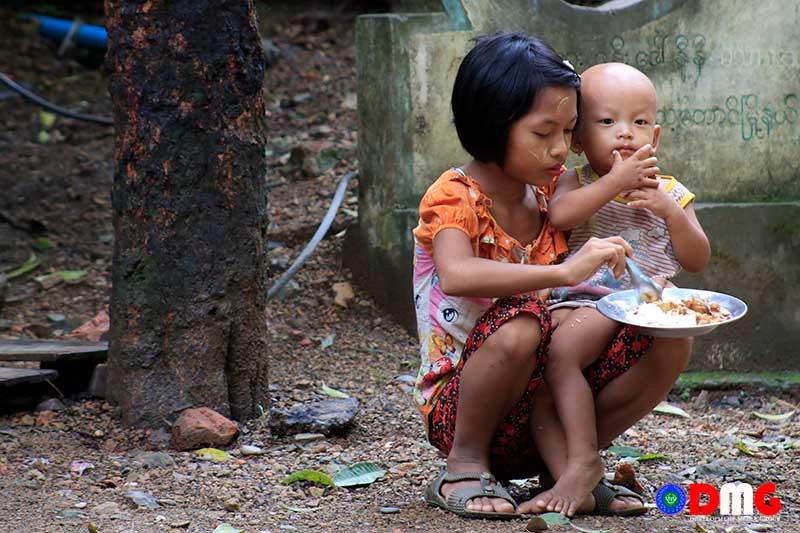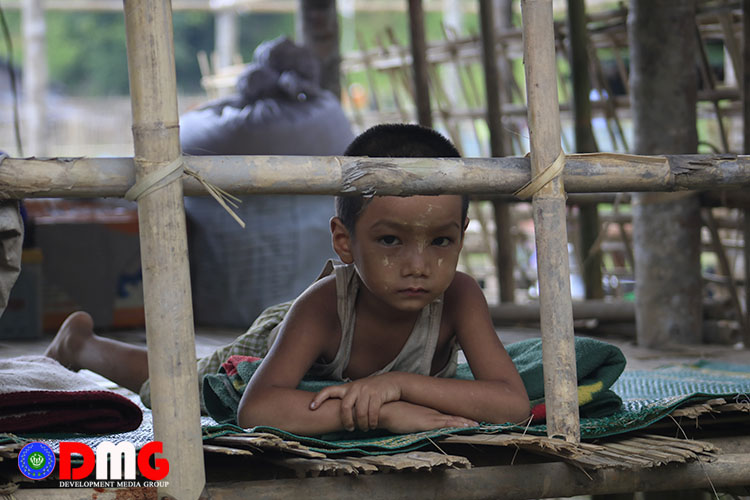- IDPs in Kyauktaw struggle with collapsing shelters amid aid shortages
- Travel restrictions deny Arakanese youth access to higher education
- Motorists fined K30,000 for traffic violations in AA controlled areas
- Inmates escape from Kyaukphyu Prison amid heightened security
- Arakan farmers struggle as paddy market collapses, debts mount
Legacy of War Lives On in Minds of Its Youngest Victims
Children who have personally experienced the atrocities of war inevitably relive those traumatic experiences, and often suffer from recurring nightmares that further instill fear in them.
18 Mar 2023

Written by Win Nyunt
Ma Phyu Nwe Win felt her heart breaking as she looked at the spaces at her sides on the bed. The knowledge that she has lost the nucleus of her family is still a bitter pill for the 12-year-old to swallow.
“I remember my mom whenever it is bedtime,” Ma Phyu Nwe Win mumbled in a shaky voice.
The fifth grader was sleeping between her father and mother on November 9 of last year, the last night she was able to do so. She is now struggling to learn to sleep alone.
“When I lie down on my bed, I feel as if mice are crawling near bed. The atmosphere is not right. So, I want to cry. I want my mother back,” she said as she burst into tears.
Junta troops slaughtered nine people in the village of Hsiningyi, part of Arakan State’s Ponnagyun Township, on November 10, 2022. Among the victims were U Khin Maung, 55, and Daw May Nu, 50, the parents of Ma Phyu Nwe Win, who used to sleep beside her.
Since the day they were killed, Ma Phyu Nwe Win has cried herself to sleep, said her 24-year-old sister Ma Moe Thidar.
“She would talk in her sleep, saying, ‘Mom, sleep beside me,’ before waking up suddenly. When she woke up, she sounded gloomy, and said she missed her mom,” said Ma Moe Thidar.
Ma Phyu Nwe Win is the youngest of six siblings. She currently lives with her sister Ma Moe Thidar and her family. Ma Moe Thidar said she dreads thinking about whether her young sister’s emotional scars will ever heal.
Like Ma Phyu Nwe Win, many children have lost family members, been injured or even killed in the armed conflicts that have plagued Arakan State.
On November 10, junta troops responded with artillery and air attacks after the Arakan Army (AA) carried out an attack on a junta vehicle along the Yangon-Sittwe road.
Seventh grader Maung Khin Maung Tun was injured when artillery shells landed on Ngatgyikyung Village.
“I was in my house when shrapnel from the attack hit my knee. I freaked out,” the 13-year-old recounted.
The teenager is still haunted by the fear he was gripped with that day. Family members worry that his mental condition will get worse.
“He is still very frightened. His brain might be paralysed by fear in the long run. His parents are concerned about his well-being,” said Maung Khin Maung Tun’s uncle, U San Shwe Maung.
According to a DMG rally, 40 children were killed or injured by fighting, artillery strikes and landmine explosions in Arakan State and Chin State’s Paletwa in 2022, accounting for nearly 18 percent of total casualties.
Children who have personally experienced the atrocities of war inevitably relive those traumatic experiences, and often suffer from recurring nightmares that further instill fear in them.

A psychiatrist from Yangon, who did not want to be named, said that if someone is personally affected by the brutality of war, the fear will stay with them for the rest of their life.
“What is the difference between trauma in children and trauma in adults? Children’s trauma tends to be more subtle,” the psychiatrist explained.
During the military tensions in Arakan State, children suffered alongside adults in enduring indiscriminate shellings and other violence, but some were also left behind when their parents or other loved ones were taken away.
Social activist Ko Zaw Win aka Ludu Zaw Win from Kyauktaw Township, Arakan State, was handcuffed and taken away by junta soldiers on June 21, 2022. While the family members were having a meal, about 40 junta soldiers raided the house and arrested Ko Zaw Win. His children saw their father being arrested by the junta soldiers.
“Their father was handcuffed and arrested by the soldiers, and the children were left crying. As a mother, I don’t want my children to see such a scene,” Ma Khin Hla Zan, the wife of Ko Zaw Win, recalled of the incident that day.
Ko Zaw Win has three children: His eldest son is 15 years old and is attending Grade 8, his 10-year-old daughter is in Grade 3, and the youngest is less than 2 years old.
“When Ko Zaw Win was arrested, the young son was only 1 year and 2 months old. The eldest son walked the younger son on behalf of his father, and cared for him,” Ma Khin Hla Zan explained.
Children are affected by war in various ways, perhaps most visibly when they are forced to leave their homes and shelter in camps for internally displaced people (IDPs).
Daw Nyo Aye, chairwoman of the Rakhine Women’s Network, said children are the ones who experience the most mental, physical and health needs, so support and protection programs are needed.
“Some children are orphans. Some children have lost their limbs due to landmine hazards. I don’t even dare to think about the future of the children who have lost their arms and legs,” she said.

Save the Children reports that 40 percent of those displaced by conflict in Myanmar are children.
Psychological experts also say that government organisations, as well as international and civil society organisations, should provide psychological support to children who have suffered from military conflict in any way they can.






.jpg)













